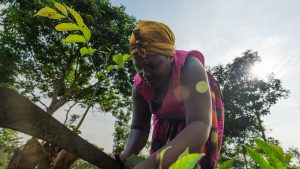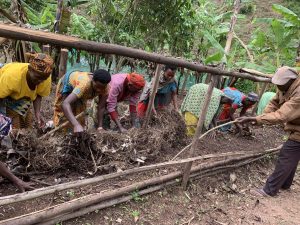Land restoration is a critical component to ensure food security. The statistics relating to the involvement of women, not only in food production but also in land restoration efforts, highlight the need to ensure their meaningful inclusion from the outset to ensure the success of land restoration efforts.
Approximately 80 percent of the world’s food is generated by small-scale farming, with women accounting for an average of 43 percent of agricultural labour in developing countries. In some places, women represent the majority of agricultural workers. For example, in South Asia, over two-thirds of employed women work in agriculture, while in Eastern Africa, more than half of farmers are women.
Key Stakeholders: Women are often responsible for managing resources (such as water, fuel and food) in their communities. Their significant involvement in agriculture positions them as essential stakeholders in land restoration initiatives.
Traditional Knowledge and Expertise: Women possess valuable knowledge of local plants and ecosystems and practices related to sustainable land management and restoration. Their experience in farming can inform effective strategies for rehabilitating degraded land by identifying native species and selecting crops that will improve soil health and they often employ sustainable practices like crop rotation and agroforestry which contribute to soil fertility, biodiversity and water conservation which are all key elements of land restoration.
Community Impact: Engaging women in land restoration can lead to broader community benefits as in many communities women lead the way in local environmental conservation efforts, such as tree planting projects and the management of communal land. When women are empowered to restore land, they share their knowledge and skills, enhancing resilience and sustainability for future generations within the community.
Policy Implications: Recognising the role of women in both agriculture and land restoration underscores the need for gender-sensitive policies. Their unique perspectives and experiences can influence the development of policies that improve outcomes for both women and the environment.
Empowerment Through Involvement: Engaging women in land restoration not only empowers them but also enhances the effectiveness of restoration projects. When women participate in decision-making processes, they bring unique perspectives that can lead to more inclusive and holistic approaches. Empowering women in these roles fosters greater community resilience and promotes social equity, which are essential for the long-term success of restoration initiatives.
Knowledge and Skills Transfer:Training programs associated with land restoration projects often focus on equipping women with new skills and knowledge. Workshops on sustainable agriculture, soil health, and biodiversity conservation not only enhance their capacities but also encourage them to share this knowledge within their communities. This ripple effect can lead to widespread adoption of sustainable practices, ultimately benefiting larger ecosystems.
Addressing Challenges: While the contributions of women are invaluable, they often face significant barriers in land restoration efforts. Limited access to resources, land ownership, and decision-making power can hinder their participation. Addressing these barriers is crucial for successful restoration efforts. Organisations and governments can play a pivotal role by ensuring that women have access to training, financial resources, and platforms for their voices to be heard in restoration discussions.
GEA Members: Women Making a Difference
Here are some examples of women-led organisations making a difference in land restoration efforts
REFACOF:
The African Women’s Network for Community Management of Forests (REFACOF) was created to promote women’s rights in Africa and advocate to shape policies and practices for gender equity in relation to land and forest tenure. REFACOF is an advocacy platform focused on African women’s tenure rights in land and forest reforms. The network is composed of 20 Member countries from Central Africa and West Africa, and Madagascar. Founding President, Cécile Ndjebet is winner of the 2022 Wangari Maathai Award as well as a joint winner of the prestigious Gulbenkian Prize for Humanity which celebrates global climate action and solutions that inspire hope.
In Cameroon, REFACOF works in the three mangrove areas: the Douala estuary, the Rio del Rey and the Rio Ntem and their interventions have resulted in the restoration of 600 ha of degraded areas of mangroves and terrestrial forests. This restoration (including the establishment of tree nurseries) involved over 3,000 local workers, with women making up about 80% of the workforce.
SWAGEN:
Support for Women in Agriculture and Environment (SWAGEN) is an indigenous organisation founded and owned by grassroots women in Uganda on a mission to create strong women groups capable of active participation in and meaningful contribution to mainstream national development. SWAGEN’s Forest Resource Conservation led to 30 000 members of the forest edge local community establishing and maintaining tree nurseries, including thrashing, digging holes, transfer planting, spot weeding, pruning the young trees, creating firelines and guarding the forest against destruction by livestock. The creation of these jobs and the provision of agroforest fruit trees to grow and sell, improved the incomes of 30 000 households from less than US$1 per day to US$30 per day as well as providing access to goods and services like education, medical care and basic needs and the fruit trees have improved the nutrition of the local communities.
Gertrude Kenyangi, SWAGEN’s Executive Director, was also the recipient of the Wangari Maathai Prize in 2015 for tree planting as well as the ONE Prize 2015 for eradication of extreme poverty.
Women are key agents of change in land restoration efforts, bringing unique knowledge, skills, and perspectives that enhance sustainability and community resilience. Recognising and supporting their contributions is essential for the success of restoration initiatives and as we move forward it is imperative to ensure that women are not just participants but leaders in the movement to restore our planet.


